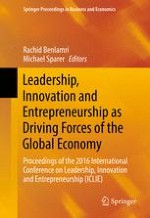2017 | OriginalPaper | Chapter
28. Is the Avalanche of E-learning Coming to the UAE?
Authors : Dennis Lee, Elissar Toufaily, Tatiana Zalan
Published in: Leadership, Innovation and Entrepreneurship as Driving Forces of the Global Economy
Publisher: Springer International Publishing
Activate our intelligent search to find suitable subject content or patents.
Select sections of text to find matching patents with Artificial Intelligence. powered by
Select sections of text to find additional relevant content using AI-assisted search. powered by
